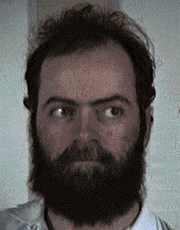




 http://http.cs.berkeley.edu/~hodes
http://http.cs.berkeley.edu/~hodes


The COSMOS research group develops systems that enable reactive, expressive, and high quality synthesis of sound.





 http://http.cs.berkeley.edu/~hodes
http://http.cs.berkeley.edu/~hodes


The analysis method we use, derived from IRCAM tools, is in the spirit of sinusoidal modelling of Macaulay and Quatieri and starts with classical spectral estimation based on peak picking and interpolation of STFT frames.
These peaks are then organized into streams using HMM (Hidden Markov Model) or by local search around integer multiples of a running f0 estimate.
Guillermo Garcia is extending these tools and applying them to a growing library of sounds that serve as timbral prototypes for higher level control.
Michael Goodwin is working on residual (noise) analysis and modelling.
Sukandar Kartadin is exploring hardware and software solutions to enable high quality analyses to be performed in real-time with multiple channels of sound.
Michael Lee, Sherwin Liu and David Wessel are working on machine learning tools for timbre space organization, representation and manipulation.
Adrian Freed is responsible for the real-time synthesis tools that include HTM, BYO and several additive synthesis implementations within these frameworks. These environments are designed to be network accessible and extensible. Work is underway to document, distribute and encourage enhancements to this software.
Spectral Description Interchange File Format (SDIFF) support is being added to our real-time synthesis environment
Todd Hodes is working on additive synthesis implementation on the T0 vector microprocessor.
Christopher Lennard and Adrian Freed are working on VLSI implementations of additive synthesis.
Tibor Knowles and David Wessel are building a dynamic dispersion loudspeaker array for instrument source modelling.
Guy Garnett is working on a conducting interface.
Amar Chaudhary is developing interactive tools to view and manipulate our analysis data and models. These tools will be connected with real-time synthesis.
Patents and copyrighted software related to the COSMOS project are available for licensing. For further information contact the UC Berkeley Office of Techology Licensing.